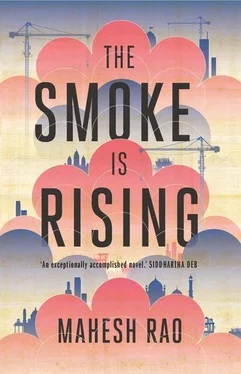‘Can we please talk in the morning? I promise I will tell you everything,’ said Mala, her voice nearly severed with exhaustion.
The house returned to darkness and they all went to bed.
‘She can’t come running here every time they have a quarrel,’ grumbled Babu, settling his hip into the familiar dip in the mattress, ‘I’ll tell her tomorrow.’
‘You don’t tell her anything, at least until we have found out what has happened,’ snapped Rukmini, finding an outlet for the anxiety that had begun to well up in her breast.
‘What is a life without compromise?’ asked Babu, turning over to face the wall, and falling asleep immediately.
Rukmini shot him a dark look and locked her hands over her belly. She knew that the combination of worry and annoyance would keep her up for most of the night.

The next morning the three of them moved around the house like strangers at the scene of a calamity. Rukmini and Mala were excessively polite, smothered in a flurry of banal enquiries and reassurances. Babu remained silent, but his wordlessness had the quality of glue, oppressing the other two as it oozed over their efforts at normalcy. Just as Mala had steeled herself to begin some kind of a genuine conversation with her parents, there was a knock on the door. One of Babu’s ex-colleagues and his wife were delivering invitations to their son’s wedding. They were surprised, they said, and delighted that Mala was there too. Babu and Rukmini would have to ensure that she came with them to the wedding, if she planned to be in Konnapur. Rukmini laughed. Mala’s plans changed all the time. How had she given birth to two such disorganised daughters?
After the visitors had left, the three sat down at the table. Before Mala said anything of significance she asked them for one thing only, that she be granted the concession of being allowed to tell them the whole truth. Once her account was given, she was prepared to collude in whatever connivance was required to placate the outside world. She had after all become an expert at dissimulation and deviation over the past few years. Whether what was required was an artful silence or a cunning pantomime, she was willing to participate, as long as her parents would grant her the grace of hearing what she had to say.
It was a festival day in Konnapur. Reedy drifts of nadaswara accompanied by solid drumbeats were approaching the temple, less than a couple of kilometres away. As Mala spoke, she had to stop from time to time as the noise engulfed her words. The procession was getting closer. A celebratory rattle descended around the figure of the deity, hoisted on the shoulders of several young men. Rukmini closed the windows and returned to the table. Babu continued to look at his hands, placed flat on the table’s surface, as if to show that he too had nothing to hide. The barrage touched the walls of the house as it passed by. It forced its way into the room and tried to wolf down Mala’s testimony. Finally, it moved away, sweeping its rhythm and quake to the foot of the temple’s soaring tower.

Those in charge of the beautification of the area around Tejasandra Lake had unspoken aims far greater than the mere spectacle of a festival. They were setting down a template for aspiration, new rules to govern public spaces, perhaps even changing the fabric of modern urban mores. In the name of the common good, the crude and the coarse had to be conquered and a ruthless grandeur imposed. The benefits would be self-evident to all the faithful who witnessed the celebrations at the edge of the lake. To the rest, invisibility would be graciously bequeathed.
The theme park farmers had been effaced from the public’s consciousness with a brisk stroke. The news of the High Court decision had made front page news and all the major bulletins, of course. But then a membrane had seemed to knit over the wound even before it began to heal. The farmers were back on their land, the old fears flourishing again, as if they had never been assured of any kind of victory in the first place. Meanwhile the drone of topicality had settled over the latest corporate scam, cricketing disappointments and renewed party factionalism before inevitably moving on again. All over the country the curators of public interest knew that attention spans were short but appetites ravenous.
The pressure on the farmers was beginning to mount. Acres of sugar cane abutting the proposed HeritageLand site were found blazing mysteriously. Irrigation equipment was damaged in the middle of the night. A number of farmers were arrested on the basis of incomprehensible charges and refused bail. Intimidating representatives of a prominent land developer began to pay visits to some of the houses in the affected areas. A group of former activists were badly assaulted and abandoned in a gully. Wells were poisoned. Four young men who had set out on a pilgrimage, praying to see an end to the villages’ troubles, never returned.
At the same time, a new movement had taken form. The definitive failure of Vasu and his colleagues meant the rise of something far more hostile, a combative ardour that moved around the periphery of the city like a silent cyclone. The aim of these farmers was to reclaim their visibility and retrace their faded outlines by taking their grievances, not to the palaces of justice, but to the boulevards of culture.
The eyes of the world would soon be on Mysore. They were determined that along with the dazzle of celebrity and the sheen of art, the world would be blinded by the flame of their protests along Tejasandra Lake.
This time they had taken close charge of all preparations. There would be no advance notice to the authorities and no opportunity for pre-emptive action. They would arrive in Mysore in batches, separate groups making their way to the Promenade at designated times for maximum impact. They knew what to carry and where to hide. Two vests, a thick flannel undershirt and wadded up plastic bags would provide a few layers of protection when the lathis began to strike. Chilli powder flung into the air as policemen approached would release a few seconds of valuable time. Scarves and monkey caps were essential to avoid identification on CCTV. Breathing through a wet cloth tied around the nose and mouth would help temper the violent sting of tear gas. Rubbing a rag soaked in vegetable oil on skin could help alleviate any burning sensation. Tear gas canisters were extremely hot and could only be picked up if hands were protected. If trying to escape pursuit, nails and sharp fragments of brick scattered in the road could puncture the tyres of police jeeps and motorbikes.
Vasu’s brothers would return late at night in the week before the Lake Utsava, their hoarse whispers dying down as they unrolled their bedding in the front room. In hardly any time their breathing would be heavy and even, filling every corner of the house. Facing away from them on the far side of the room, Vasu would be awake until the early hours, marking the passage of night with the beat of his right foot against the floor. He was not allowed to be privy to the preparations around him, but they were breaking his heart.

Mala’s tale was different from other tales. Some of it was told that first morning but its full heft could only be conveyed in the refuge of long silences and the nuance of truths only partially exposed. Its substance came from her gradual disclosures and her irregular recollections. Rukmini was a patient woman and did not push Mala into giving her an immediate and complete account. Her questions were never unprompted and her observations fell gently into their laps, like down. She did, however, watch Mala constantly. As she prepared lunch, sinking her knuckles into the roll of dough, she would glance across at her daughter’s moving shadow. When they knotted up plastic bags of vegetables from the market to put into the fridge, her gaze would settle on Mala’s silent profile. In the evenings she would make sure she could hold Mala, reading on the back steps, steadily in her sight. She was not sure if Mala was aware of this vigil; she was barely aware of it herself. But at this time, it was all she could do.
Читать дальше













